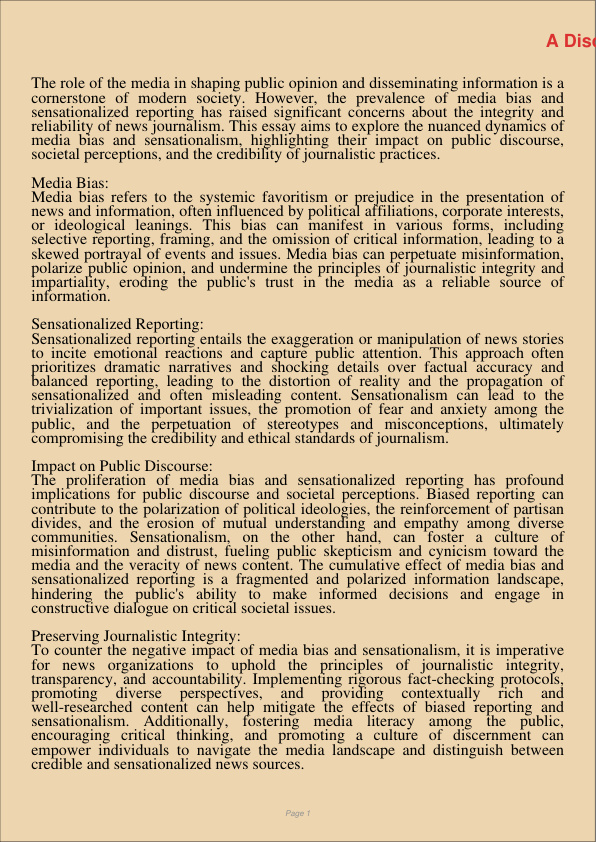A Discussion Of Media Bias And Sensationalized Reporting In News Journalism
Dec 31, 2023
sensationalized reporting
news journalism
Literature
Journalism & Communication

The role of the media in shaping public opinion and disseminating information is a cornerstone of modern society. However, the prevalence of media bias and sensationalized reporting has raised significant concerns about the integrity and reliability of news journalism. This essay aims to explore the nuanced dynamics of media bias and sensationalism, highlighting their impact on public discourse, societal perceptions, and the credibility of journalistic practices.
Media Bias: Media bias refers to the systemic favoritism or prejudice in the presentation of news and information, often influenced by political affiliations, corporate interests, or ideological leanings. This bias can manifest in various forms, including selective reporting, framing, and the omission of critical information, leading to a skewed portrayal of events and issues. Media bias can perpetuate misinformation, polarize public opinion, and undermine the principles of journalistic integrity and impartiality, eroding the public’s trust in the media as a reliable source of information.
Sensationalized Reporting: Sensationalized reporting entails the exaggeration or manipulation of news stories to incite emotional reactions and capture public attention. This approach often prioritizes dramatic narratives and shocking details over factual accuracy and balanced reporting, leading to the distortion of reality and the propagation of sensationalized and often misleading content. Sensationalism can lead to the trivialization of important issues, the promotion of fear and anxiety among the public, and the perpetuation of stereotypes and misconceptions, ultimately compromising the credibility and ethical standards of journalism.
Impact on Public Discourse: The proliferation of media bias and sensationalized reporting has profound implications for public discourse and societal perceptions. Biased reporting can contribute to the polarization of political ideologies, the reinforcement of partisan divides, and the erosion of mutual understanding and empathy among diverse communities. Sensationalism, on the other hand, can foster a culture of misinformation and distrust, fueling public skepticism and cynicism toward the media and the veracity of news content. The cumulative effect of media bias and sensationalized reporting is a fragmented and polarized information landscape, hindering the public’s ability to make informed decisions and engage in constructive dialogue on critical societal issues.
Preserving Journalistic Integrity: To counter the negative impact of media bias and sensationalism, it is imperative for news organizations to uphold the principles of journalistic integrity, transparency, and accountability. Implementing rigorous fact-checking protocols, promoting diverse perspectives, and providing contextually rich and well-researched content can help mitigate the effects of biased reporting and sensationalism. Additionally, fostering media literacy among the public, encouraging critical thinking, and promoting a culture of discernment can empower individuals to navigate the media landscape and distinguish between credible and sensationalized news sources.
In conclusion, the prevalence of media bias and sensationalized reporting poses significant challenges to the credibility and trustworthiness of contemporary news journalism. By acknowledging these challenges and fostering a culture of ethical reporting, transparency, and balanced discourse, the media can uphold its vital role in promoting informed public dialogue, fostering social cohesion, and advancing the principles of democratic engagement and transparency.